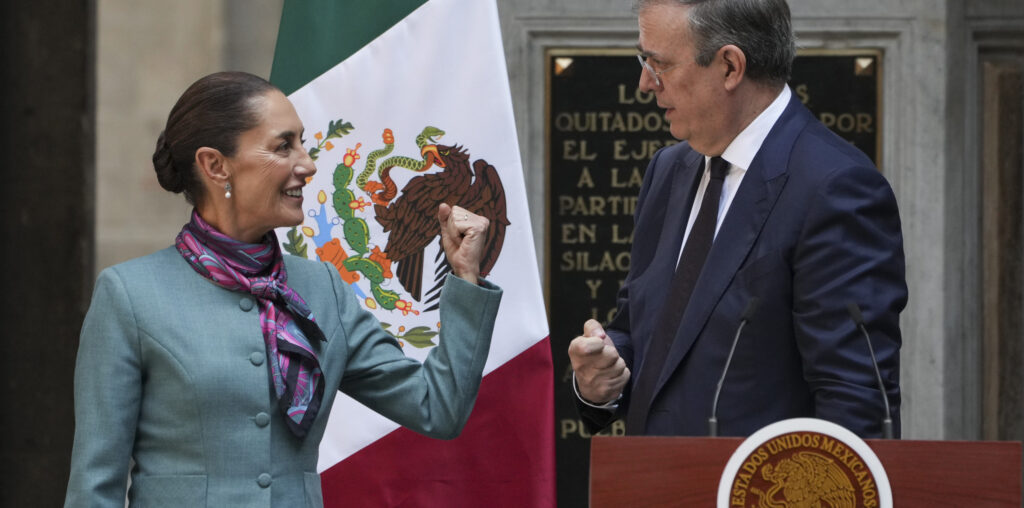As Donald Trump plans for his return to the White House, Mexico’s new president, Claudia Sheinbaum, is preparing for the repercussions for her country.
During Trump’s first term, Mexico became a prime target for his sharp rhetoric and policies, facing threats of border closures, tariffs, and U.S. forces crossing into Mexican territory to combat drug cartels.
However, the dynamics are different now Mexico is being led by a politician with Sheinbaum’s background rooted in activism and ideological commitment, in contrast to former President Andrés Manuel López Obrador who shared Trump’s pragmatic, transactional approach to politics.

Fernando Llano/AP
In 2019, López Obrador’s straightforward style and willingness to concede to Trump’s demands on immigration set the tone for a relatively cooperative relationship between the two leaders.
Will Trump and Sheinbaum Get On?
But Sheinbaum’s ideological stance may bring a different tone to her dealings with Trump.
“Claudia is more ideological than López Obrador,” said Arturo Sarukhan, former Mexican ambassador to the U.S.
He predicted a potentially “nationalistic” response from her administration to Trump’s tough policies on crime, immigration, and trade.
Sheinbaum was one of the first leaders to reach out to Trump with a congratulatory call after his election win. However, she was met with a reminder of Trump’s ongoing border concerns.
Trump also made a point of sending greetings to López Obrador, perhaps signaling he still sees her predecessor as the key figure in Mexico’s leadership—a sentiment shared by some analysts.
U.S.-Mexico trade surpasses $800 billion annually, but looming over this economic success is the U.S.-Mexico-Canada Agreement (USMCA), up for review in 2026.
Mexico has enacted recent legal changes that could trigger Trump to push for renegotiations, especially in areas affecting the auto industry.
Sheinbaum has signaled that Mexico won’t back down in its negotiations with Trump’s future administration. She said that any issues will be approached through dialogue but she warned, “We are prepared to stand up if needed, with great unity.”
Could China Use Mexico to Gain Access to US?
The specter of competition with China further complicates the outlook.
There is concern that Chinese companies may leverage trade rules to export goods through Mexico to the U.S., putting additional pressure on the USMCA framework.
In a past dispute, Mexican official Marcelo Ebrard, who was foreign minister under López Obrador, acceded to some of Trump’s demands, including agreeing to keep asylum-seekers on Mexican soil.
Now serving as Mexico’s economy secretary, Ebrard will again represent Mexico in U.S. trade discussions. He remains optimistic about the future, pointing to economic interdependence as a buffer against Trump’s potential tariffs or border closures.
“If you put up a tariff, it will have repercussions in the United States,” Ebrard said.
However, some diplomats caution that such optimism might be misplaced.
Martha Bárcena, former ambassador to the U.S., said that Trump’s immigration stance is driven by “national security and cultural identity,” not economic logic, suggesting that his administration might still pursue deportations.
War On Drugs
Recent signals from Sheinbaum’s administration suggest a shift from López Obrador’s hands-off approach against drug cartels toward a more active stance.
A notable seizure of 300,000 fentanyl pills in Tijuana last week suggests an intent to address the drug crisis more aggressively.
As Sheinbaum navigates these complex dynamics, the question remains: How far will Trump go if he returns to office?
Sarukhan said “I do think he will talk loudly and carry a big stick.”
This article includes reporting from The Associated Press

